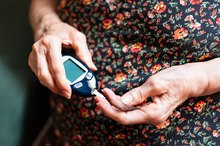What does fact checked mean?
At Healthfully, we strive to deliver objective content that is accurate and up-to-date. Our team periodically reviews articles in order to ensure content quality. The sources cited below consist of evidence from peer-reviewed journals, prominent medical organizations, academic associations, and government data.
The information contained on this site is for informational purposes only, and should not be used as a substitute for the advice of a professional health care provider. Please check with the appropriate physician regarding health questions and concerns. Although we strive to deliver accurate and up-to-date information, no guarantee to that effect is made.
Why Does My Sweat Smell Sweet?
The human body gives off a surprising variety of odors, which people spend a great deal of money and effort trying to mask or neutralize. A strange body or breath odor-different from the typical locker-room type of body odor with which most of us are familiar-could indicate a health problem. If you notice that your sweat has begun to smell sweet, you should bring it to your doctor's attention.
Smells and Medicine
In the past, doctors followed their noses toward the source of many diseases. Unusual body odors can range from fish to rotten eggs to maple syrup or apples. Today, doctors still recognize that some diseases, like yeast infections, carry distinctive odors. For example, an uncommon metabolic disorder called maple syrup urine disease can cause a sweet body odor. The most common cause for sweet body odor is ketoacidosis, a complication of Type I diabetes.
- In the past, doctors followed their noses toward the source of many diseases.
- For example, an uncommon metabolic disorder called maple syrup urine disease can cause a sweet body odor.
Ketoacidosis
Disorders That Cause a Sweet Smell on the Body
Learn More
With undiagnosed or inadequately controlled Type I diabetes, the body has trouble producing enough insulin to break down sugars for energy. Instead, the body burns fats. This leads to a buildup of acids called ketones in the blood and urine. The ketones can cause a distinctive fruity odor on your breath and body. It may be the first symptom that sends you to a doctor. Left untreated, ketoacidosis can lead to diabetic coma and even death 2.
- With undiagnosed or inadequately controlled Type I diabetes, the body has trouble producing enough insulin to break down sugars for energy.
- This leads to a buildup of acids called ketones in the blood and urine.
Symptoms of Ketoacidosis
That fruity body odor should be your first clue to see a doctor.
Tests and Diagnosis
Signs & Symptoms Hypoglycemia & Hyperglycemia
Learn More
Other tests for ketoacidosis measure blood pressure, amylase, arterial blood gas, blood glucose or potassium.
Treatment of Ketoacidosis
If you are not already receiving insulin, your doctor may prescribe it; if you are already on insulin, your doctor may adjust your dosage. If your ketoacidosis progresses far enough, you may be hospitalized and placed in fluid and electrolyte replacement therapy as well as insulin therapy. If diabetes is not the cause of your ketoacidosis, you will undergo further tests to pinpoint the cause, such as infection, reaction to medication or another underlying disease.
Related Articles
References
- Neuroscience for Kids Newsletter: the Lost Medical Art of Smelling
- Medline Plus: Diabetic Ketoacidosis
- Maahs DM, et. al. Rates of diabetic ketoacidosis: International comparison with 49,859 pediatric patients with type 1 diabetes from England, Wales, the U.S., Austria, and Germany. Diabetes Care. 2015;38(10)1876-1882; doi:10.2337/dc15-0780
- Westerberg DP. Diabetic ketoacidosis: Evaluation and treatment. American Family Physician. 2013;87(5):337-346.
- Lin MV, Bishop G, Benito-Herrero M. Diabetic ketoacidosis in type 2 diabetics: a novel presentation of pancreatic adenocarcinoma. J Gen Intern Med. 2010;25(4):369-373. doi:10.1007/s11606-009-1237-9
- Harvard Health Publishing. Diabetic ketoacidosis: what is it? Updated January, 2019.
- Mays J, et. al. An evaluation of recurrent diabetic ketoacidosis, fragmentation of care, and mortality across Chicago, Illinois. Diabetes Care. 2016;39(10)1671-1676. doi:10.2337/dc16-0668









